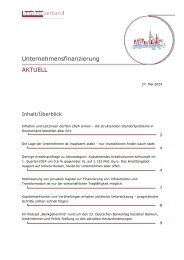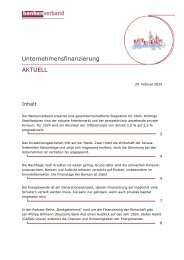Strong banks for a single European financial market
The last few years have seen the EU take its first steps towards establishing a single European financial market. But these aren`t yet enough! In the following pages, we outline measures that will help to create a single European market.
The last few years have seen the EU take its first steps towards establishing a single European financial market. But these aren`t yet enough! In the following pages, we outline measures that will help to create a single European market.
You also want an ePaper? Increase the reach of your titles
YUMPU automatically turns print PDFs into web optimized ePapers that Google loves.
It is surely in the interests of the EU to retain the ability to<br />
influence how these technologies are used, especially when<br />
fundamental social values such as the right to personal data<br />
are affected. This can only be achieved if the EU becomes a<br />
leading location <strong>for</strong> digital technologies.<br />
Example: cloud outsourcing<br />
As digitalisation proceeds apace, it is essential that <strong>banks</strong><br />
can make efficient use of cloud services, both as the<br />
infrastructure behind their own digitalisation projects<br />
and when collaborating with fintechs. The flexibility and<br />
scalability that cloud services offer must not be hindered<br />
by excessive regulatory requirements. A possible approach<br />
to ease the implementation of cloud services could be the<br />
certification or direct supervision of cloud service providers<br />
at <strong>European</strong> level.<br />
A high level of data protection, both accorded by law and<br />
applied in practice, should there<strong>for</strong>e be seen as a locational<br />
advantage. Nevertheless, data protection should not act<br />
as a brake on future business models, but should facilitate<br />
them, and should be continuously refined to accommodate<br />
new technical possibilities. High legal standards must not be<br />
allowed to prevent technological innovation from the outset.<br />
data protection law are really appropriate given the current<br />
pace of innovation and the huge potential of big data. Do<br />
they perhaps, instead, cause opportunities <strong>for</strong> customers<br />
and providers to be wasted in a way that does not happen<br />
in other parts of the world? In a global data economy, data<br />
protection must also be judged by its ability to avoid placing<br />
excessively high barriers in the way of new business models.<br />
On no account should it encourage providers to migrate<br />
offshore. A balance there<strong>for</strong>e needs to be struck between<br />
the ability to innovate, on the one hand, and sensible and<br />
effective data protection, on the other.<br />
Example: data protection in<strong>for</strong>mation<br />
Customers must have transparency and in<strong>for</strong>mation about<br />
how their data will be used. But they should not be overwhelmed<br />
with a flood of in<strong>for</strong>mation which may ultimately<br />
be ignored. We there<strong>for</strong>e recommend developing uni<strong>for</strong>m<br />
standards <strong>for</strong> consumer in<strong>for</strong>mation that can be presented<br />
concisely in the <strong>for</strong>m of icons, bullet points or a one-pager.<br />
It is debatable, with this in mind, whether the principles<br />
of data economy and strict purpose limitation in <strong>European</strong><br />
Digitalisation


















